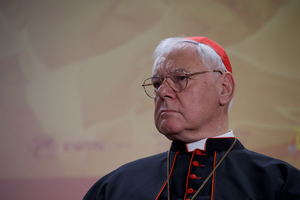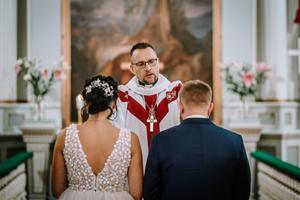Iraqi Catholic Official Who Survived 5 Assassination Attempts: 'Jesus Told Me Not to Fear'
Assyrian Iraqi Christian Pascale Warda served as minister for immigration and refugees in the Iraqi interim government that followed the 2003 U.S.-led invasion of Iraq.

BUDAPEST, Hungary — Assyrian Iraqi Christian Pascale Warda was not deterred when would-be assailants tried to kill her five times, vowing instead to bring the light of good governance to her nation stricken by the aftermath of war.
As minister for immigration and refugees in the Iraqi interim government that followed the 2003 U.S.-led invasion of Iraq, Warda was regarded as a fierce warrior against corruption in a Muslim-majority government, serving from 2004 to 2005 as one of the very few Christians and women in the first government that followed the ousting of Saddam Hussein.
A married mother of two adult children, Warda now works for the Hammurabi Human Rights Organization, an organization she co-founded in 2005 with her husband, William, to help forge better relations between Iraq’s minorities. Their work was recognized by the U.S. State Department in July this year when it awarded them one of its inaugural International Religious Freedom Awards, which recognize “extraordinary advocates of religious freedom from around the world.”
Speaking to the Register on Nov. 27 in Budapest, where she was attending the Second International Conference on Christian Persecution, Warda recounts those attempts on her life, explains how her faith helped her get through them, and how her “apostolic formation” equipped her to battle against corruption against all odds.
What exactly happened when attempts were made on your life, and how much did your faith help you through those times?
It’s important to see faith is a part of you; it’s not something you can take or leave from somewhere. It’s your life. It’s not a question of: “Ah, I will be Christian or not Christian; I’m very Christian now, and afterward I’m not a Christian.” No, no — even when I don’t speak about Christianity or Christian issues, what I do or say has a Christian perspective, even subconsciously, because I’ve grown up like that. I grew up Christian and was educated a Christian.
A French journalist was staying with me and writing a “day in the life” of me as a minister. We got in the car with many bodyguards, and he said: “You’re in danger! How do you feel? You are not afraid?” I said: “Afraid, yeah, maybe, but to stop, no. Nothing will stop me.” “How can you go?” he asked, and he was afraid to go with me. I said, “As you like, you can stay at home. I will go.” “What is making you go?” he asked. “Nobody is making me go, just this: In the name of the Father, Son and Holy Spirit — and I go. Jesus told me not to fear, and so I will not fear. If I’m ever called to be a martyr, so be it. I am here for that. If Jesus wants that, I’ll be in the service of all these people who are living in great darkness, bringing them a little of his light.” “No one speaks like this,” he said. “I said, ‘Yes they do, and yet you’re French, but you say this as though it’s from the 13th century. Well, it’s our life today.’”
Christians are here amid this bad situation and all the history we have, but we are always considered, even by our Muslim brothers, as lights in this country. So we will stay with them, we will work for them, and we will change their lives for the better.
To bring them the light of Christ.
Yes, because we believe that being there with them, we achieve things and do them in his name.
How did they attack you?
In different ways. I was coming out of my house one day, I saw a strange car, a very old car, coming after us, and I told my bodyguard, “You know, a strange car is following us,” and he said, “It’s fine; it’s nothing — don’t worry.” My bodyguard was an Armenian, and I told him he had no sense of security, that I was sure this car was not good. So I entered the government compound and showed my badge. The car followed — and boom. My head hit the roof of my car! I told him: “You are not a good bodyguard. I told you this car was moving strangely. They were waiting for me.”
Were other attempts similar?
Yes; once I was passing Liberation Square. I’d just been through the underpass, and something exploded, just after I’d gone through. I’m just protected. John Paul II put his hand four times on my head!
Another time, I called my bodyguards over to my house to give them their badges. When they came back to the office in my cars, they [the would-be assassins] thought I was with them, but I was not with them. Four of them were killed, and two were wounded.
On another occasion, I was at a press conference in Paris, and many journalists were there, Jewish journalists; and one of them asked me: “What will you do for the Jewish people? They have houses, rights, in Iraq, especially Baghdad. Will democratic change give Jews what they need?” Big question! I said, “Okay, it’s very complicated, and we’re at the very beginning of change. … We must organize things within the country first, dealing with 4 million displaced Iraqis, and then we’ll see what we can do about everyone else. A practical regime will not say these are Jewish, Christian or Muslim, but all belong to the same country.”
You should have seen the Arab journalists there. “The Jewish minister!” they called me. The next morning a rocket was fired into my office. If I’d been there, I would have been finished. I was arriving at the ministry in the morning with my staff, driving round the back of the office to park, when it happened. We waited to make sure it had stopped, then I decided to go up to the office; it was on a high level floor. We walked past broken doors and glass. My staff said: “You might not be afraid, but we’re not going up!” So I went up alone and saw my offices completely destroyed. No one was hurt; it was just my office, and only 8:30am, so no one was in my office.
Did they ever catch the would-be assailants?
No, never; after five years, they said on television: We caught the people who attacked, but did they? I went to the minister of the interior and said: “Please, just do something.” He said, “Well, it’s not a new one; we have such situations every day.” So he felt they had to leave it because it was a daily occurrence. You see how they leave people in a habit of suffering, to make them believe that they have to live like this? So I was very, very frustrated with him. I said, “This is irresponsible. I will never, ever work with you, not because I’m afraid, but because you won’t govern.”
You were reputed to be the only ministry to never have been accused of corruption, is that right?
Maybe one or two were accused, but me and others, our names were said on television, that we arrived uncorrupted people and left uncorrupted people, so I was very happy. My first ministerial mission was to end corruption in the ministry. It was a new ministry, but there was corruption, and it had become normal.
Was your fight against corruption one of the reasons for the attempts on your life?
I think it was part of the cause; it was a real struggle. My deputy minister said: “No one will do it [clear the corruption].” And I said: “I am one; with you, we are two; our neighboring ministry is three; and, little by little, we will win over everyone — and, then, no corruption.”
Does much of the corruption also owe itself to Islam, in your view?
In their books, it says the property of the state, if it’s been given to you, you can take it; you have the right to take it.
What was it like to work with Muslim colleagues on these issues?
I would ask the Holy Spirit to tell me what to say and what to do every day, because we had to change the society. The situation was so caput, and when I worked with them, they’d say: “You are strange. You are the only one who thinks like that.” I took my [Muslim] deputy minister to show poor children receiving candy from American soldiers, and I asked her, “Why are they so poor?” “Oh, there are many people like this,” she said. “So you don’t care about them?” I asked. “Who will care about them? Soldiers? Or you, the administration?”
“Why do you think like this? There are many of them,” she said. So I said: “The money you earn is their money. You take it, and they’re like that because you take it; your children are better than they are.” “Oh, no one is thinking like you,” she said. So she left and campaigned against me in the ministry, to get me dismissed because I was doing “strange” things. … For me, this was a witness. I did nothing special, nothing extra; it’s just from our simple education: You have to do things that have to be done.
Were you ever tempted to go along with their corrupt practices?
No, never.
You had a good formation?
Yes, I had an apostolic formation. I studied theology and philosophy for years at an apostolic center where they form Catholics Christians to be right Christians in different situations. It was apostolic, in the sense of: We’re there not for us; we are there to change situations; we’re there to live simply with the grace given by God.
Did you know Tariq Aziz [Saddam Hussein’s Chaldean Catholic foreign minister]?
Yes, unfortunately! He was corrupt and not Christian, had nothing to do with Christianity. He caused shame for us Christians, because such people sell everything, their conscience.
Gain the world but sell their soul?
Yes — they only look at money because they have nothing else. They build their existence on money, not values.
Edward Pentin is the Register’s Rome correspondent.
- Keywords:
- edward pentin
- iraq
- iraqi christians















